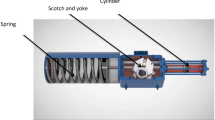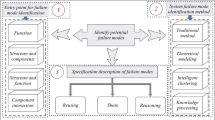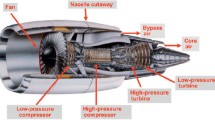Abstract
Product performance deteriorates over time, and the event in which the performance degradation reaches a pre-specified threshold value is often defined as a failure. If performance degradation of a product is observable, the degradation data can be used to obtain the information on product reliability. The degradation data often provide more information on product reliability than failure time data. For reliability qualification of mechanical components, such as pneumatic cylinders, a zero-failure test based on product failure time is widely used. When the degradation data is available, a reliability qualification test can be designed based on performance degradation data instead of failure time data. In this paper, we proposed a reliability qualification test method for pneumatic cylinders based on performance degradation data. Comparison analysis between degradation-based and zero-failure test methods was performed. The proposed reliability qualification test based on performance degradation data required a shorter test time and a lower number of samples than the zero-failure test.
Similar content being viewed by others
References
W. Q. Meeker and L. A. Escobar, Statistical methods for reliability data, Wiley (1998).
M. S. Chang, J. H. Shin, Y. I. Kwon, B. O. Choi, C. S. Lee and B. S. Kang, Reliability estimation of pneumatic cylinders using performance degradation data, International Journal of Precision Engineering and Manufacturing, 14 (12) (2013) 2081–2086.
H. S. Jeong, Design of reliability qualification test based on performance distribution at the earlier stage, Journal of the Applied Reliability, 12 (3) (2012) 131–138.
R. Pan and T. Crispin, Hierarchical modeling approach to accelerated degradation test data analysis: a case study, Quality and Reliability Engineering International, 27 (2) (2011) 229–237.
W. Nelson, Accelerated test: statistical models, test plans and data analysis, John Wiley and Sons (1990).
W. Q. Meeker and L. A. Escobar, A review of recent research and current issues in accelerating test, International Statistical Review, 61 (1) (1993) 147–168.
W. Q. Meeker, L. A. Escobar and C. J. Lu, Accelerated degradation tests: modeling and analysis, Technometrics, 40 (2) (1998) 89–99.
S. H. Mohammadian, D. Aït-Kadi and F. Routhier, Quantitative accelerated degradation testing: practical approaches, Reliability Engineering and System Safety, 95 (2) (2010) 149–159.
M. Fukuda, Reliability and degradation of semiconductor lasers and LEDs, Artech House, Boston (1991).
S. T. Tseng, M. S. Hamada and C. H. Chiao, Using degradation data to improve fluorescent lamp reliability, Journal of Quality Technology, 27 (4) (1995) 363–369.
W. P. Murray, Accelerated service life prediction of compact disks, ASTM special technical publication, 1202 (1994) 263–271.
D. S. Chang, Analysis of accelerated degradation data in a two-way design, Reliability Engineering and System Safety, 39 (1) (1993) 65–69.
J. Zhao and F. Liu, Reliability assessment of the metallized film capacitors from degradation data, Microelectronics Reliability, 47 (2) (2007) 434–436.
S. J. Bae, Application of accelerated degradation testing for vacuum fluorescent display, Journal of the Applied Reliability, 5 (4) (2005) 413–425.
S. H. Kwon, Y. H. Huh and T. J. Lim, Reliability analysis of degradation data based on accelerated model: with photointerrupter used in home video cassette recorder, IE Interfaces, 12 (3) (1999) 448–457.
W. Chen, J. Liu, L. Gao, J. Pan and S. Zhou, Accelerated degradation reliability modeling and test data statistical analysis of aerospace electrical connector, Chinese Journal of Mechanical Engineering, 24 (6) (2011) 957–962.
H. J. Lee and W. Y. Yun, An accelerated degradation test of a electronics appliance compressor, Journal of the Applied Reliability, 10 (1) (2010) 25–38.
J. H. Jung and M. S. Kim, An accelerated degradation test of electric double-layer capacitors, Journal of the Applied Reliability, 12 (2) (2012) 67–78.
F. Wang and T. Liu, Lifetime predictions of LED-based light bars by accelerated degradation test, Microelectronics Reliability, 52 (7) (2012) 1332–1336.
G. Yang, Heuristic degradation test plans for reliability demonstration, IEEE Transactions on Reliability, 62 (1) (2013) 305–311.
Y. I. Kwon, Design of reliability qualification test based on performance distribution, Journal of the Applied Reliability, 10 (1) (2010) 1–9.
Y. I. Kwon, Assessment of service life of building materials based on performance degradation, Journal of the Applied Reliability, 6 (4) (2006) 275–284.
NFPA/T2.61 R2-2000, Fluid power components-method for verifying the fatigue and establishing the burst pressure ratings of the pressure containing envelope of a metal power component, National Fluid Power Association (2000).
B. S. Kang, J. H. Shin and H. E. Kim, Statistical analysis of elastomeric seal degradation in a pneumatic cylinder with variation of temperature, Proceedings of the ASME/STLE 2011 international joint tribology conference (2011) 195–197.
G. Han and Y. Fu, Tri-stress accelerated life test for cylinders, Procedia Engineering, 16 (2011) 554–563.
J. Chen, D. Wang, Y. Fu and X. Qi, Double-crossed step-stress accelerated life test for pneumatic cylinder, Applied Mechanics and Materials, 121–126 (2012) 1274–1278.
J. Chen, Q. Wu, G. Bai, J. Ma and Z. Wang, Accelerated life test design based on wear failure mechanism for pneumatic cylinders, Proceedings of 2009 8th international conference on reliability, maintainability and safety (2009) 1280–1285.
H. K. Muller and B. S. Nau, Fluid sealing technology: principles and applications, CRC press (1998) 161–170.
ISO No. 19973-3, Pneumatic fluid power — assessment of component reliability by test — part 3: cylinders with piston rod (2007).
ISO No. 19973-1, Re-establishment of the revision of ISO 19973-1, Pneumatic fluid power — Assessment of component reliability by test — part 1: general procedures (2012).
B. Bertsche, Reliability in automotive and mechanical engineering: determination of component and system reliability, Springer (2008).
ISO No. 19973-1, Pneumatic fluid power — Assessment of component reliability by test — part 1: general procedures (2007).
Author information
Authors and Affiliations
Corresponding author
Additional information
Recommended by Associate Editor Jai Hak Park
Mu Seong Chang received the Ph.D. (Industrial and Systems Engineering) in 2007. He is a senior researcher in the Reliability Assessment Center at Korea Institute of Machinery & Materials, Korea. His research interests include reliability engineering, accelerated life testing methodology, and quality engineering.
Young Il Kwon is a Professor of Industrial Engineering at Cheongju University, Korea. His teaching and research interests are reliability engineering, lifetime data analysis, design of experiments, and statistical quality control. He has published articles in IEEE Transactions on Reliability, Naval Research Logistics, Reliability Engineering & System Safety, and International Journal of Production Research.
Bo Sik Kang is a principal researcher of Reliability Assessment Center at Korea Institute of Machinery & Materials, Korea. His research interest is reliability research of pneumatic products. He has published articles in Transactions of the KSME A and Journal of the Korean Society for Precision Engineering.
Rights and permissions
About this article
Cite this article
Chang, M.S., Kwon, Y.I. & Kang, B.S. Design of reliability qualification test for pneumatic cylinders based on performance degradation data. J Mech Sci Technol 28, 4939–4945 (2014). https://doi.org/10.1007/s12206-014-1115-1
Received:
Revised:
Accepted:
Published:
Issue Date:
DOI: https://doi.org/10.1007/s12206-014-1115-1




